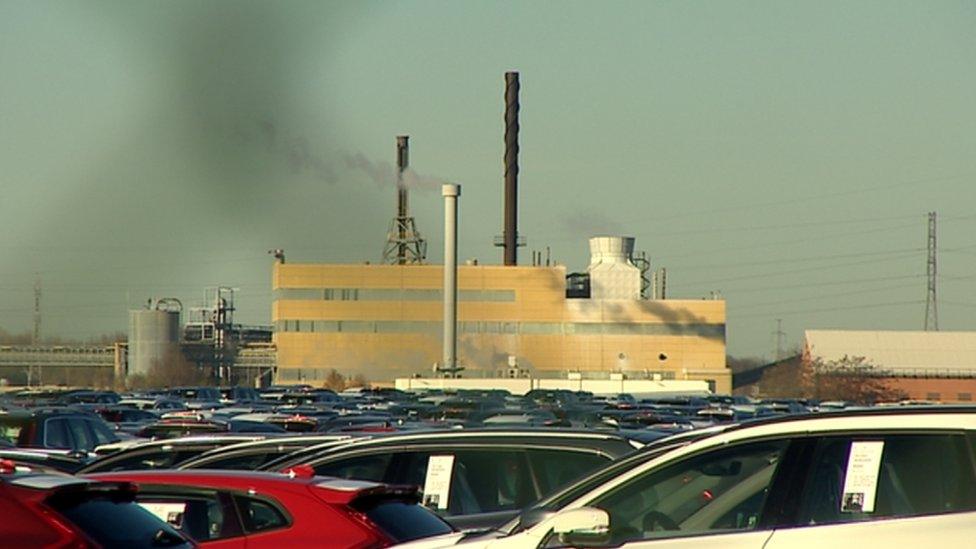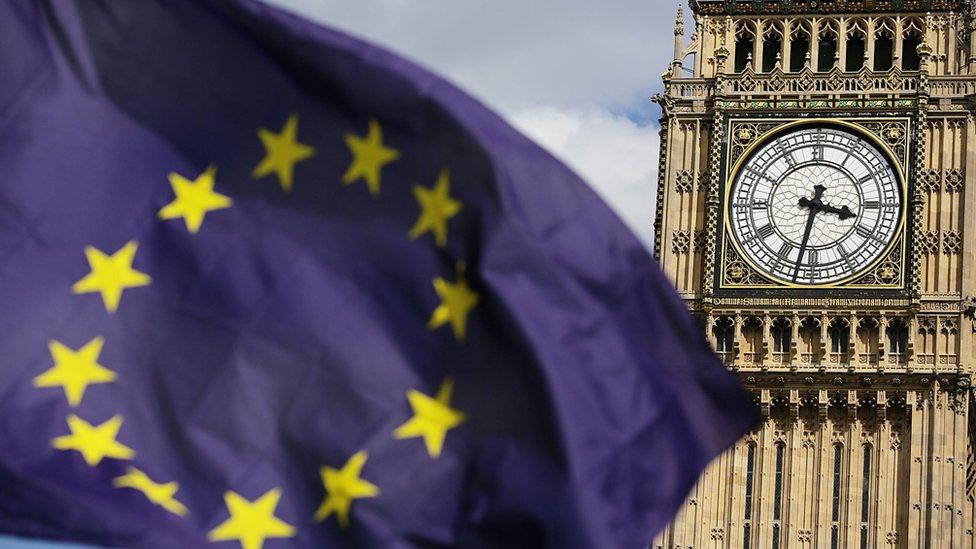Brexit: The business view from Brussels
- Published

Europe's politicians can huff and puff. They can repeat the Brexit campaign's dire warnings about the cost of breaking up trade relations.
But when it comes down to it, the business preference for a soft deal will prevail over a hard Brexit, right?
Well, up to a point. There's no doubt that business will want its voice heard. And with the exception of some who want to poach finance business from the City of London, it would like to keep trade routes as open as possible. But not at any cost.
I've just returned from Belgium, where I wanted to find out how things look from the other side of next year's Brexit negotiating table.
What I found was that the voice of business sounds firmly in favour of maintaining the integrity of the single market.
There's not much appetite for an a la carte menu of rights which might help the British negotiators get to a deal, if it opens the door to others wanting the same.
While global businesses and free marketeers can complain that the the European Union is over-regulated and sclerotic and that its currency union is doomed, the view from those based in Europe is that they like what it has done for multi-national corporations.
It has erased boundaries and trade barriers and made a much bigger market in which to expand their markets.
Two-way street
If the eventual deal - or lack of one - places the UK behind trade barriers, such as tariffs or divergence of regulation, that would be at a cost to European businesses and employment on both sides of the North Sea.
I visited one factory between Brussels and the English Channel coast where they make bespoke wooden staircases. Most of the market is for Belgians, but a fifth is sold to Britain.
It has the high-end, high-value properties that justify expenditure on a big statement staircase.

Peter Castro said his prices may have to rise next year

Smet staircases make bespoke wooden staircases
Peter Castro is managing director of Smet Staircases subsidiary in Britain, travelling to wholesale and retail clients from his Belgian home on regular trips under the Channel.
He has held prices so far, while exchange rates remain volatile. The company has hedged against such changes. But as the hedge products run to their time limits, and if sterling remains much weaker against the euro, then he says prices will surely have to rise next year.
As one who watches British politics closely, he expects a soft Brexit, being optimistic that both sides in negotiations will want a deal that minimises economic damage. But if it doesn't get that, and trade barriers come in, it will come at a significant cost to his business.
Nearby, in Ghent, an inland town with the the third biggest port in Belgium, you can see just how significant that cross-Channel trade has become.
Flemish workers cycle to work along roads buzzing with the logistics of a continent-wide economy on the move. A giant Volvo factory produces the Swedish brand of car for its Chinese owners. Many of those cars are bound for the British market.
Across the road, Honda has a vast acreage for parking its cars at its distribution hub - a Japanese company that chose to invest in an English factory so that it can sell across Europe.
Burning London
The car industry is highly integrated across borders. More than half of the value of a car made at a British plant, such as the Swindon one, will have come from imports, many of them from the continent into the UK.
British companies are similarly tied into complex supply chains for European manufacturers.
Airbus was deliberately designed to operate that way, and faces the prospect of having its British wings chopped off - or at least put behind trade barriers.

The car industry is highly integrated across borders
Pharmaceutical companies present a complex challenge, with heavy integration across the European Union and Switzerland. Britain has been an important base for them, and a change of its trading relationships could disrupt linkages.
In the service sector, it is a different story. With Britain's strengths in financial services, there are those who want to attract business to the continent's money centres, notably Paris and Frankfurt.
Global banks are preparing to make such a move out of London if they have to, where laws and regulations require them to operate and to manage their data within the boundaries of the single market.
But one senior business figure acknowledged that splitting the strength of the City of London would be liking breaking up a football team that can challenge for the Champions League title to an economic union with several teams competing in a lesser league.
'Fragmented situation'
It is widely believed in Brussels, and with certainty, that the British government has been leaning on companies which value these supply chains to lobby the other governments to do a deal that keeps these links open with Britain.
Behind the scenes, that is being confronted as one of the biggest threats to a common front between the other 27 members.
Luca Visentini is general secretary of the European Trade Union Confederation, and says that simply won't be tolerated.

The unions want to hold the line on rights of workers, the flexibility to move across borders, and an assurance that Britain won't be able to undercut European standards on maximum working hours and health and safety regulations.
"Unfortunately, at the beginning of the process, the UK government tried to play members of the European Union against one another," he said. "But this is not possible. These kind of games should not be allowed.
"If there is no positive outcome, there is a risk of a fragmented situation and a downward spiral. The risk is very high and this is something we want to avoid."
Europe's trade union movement has common cause with big business in maintaining a rule-bound union with free trade, even though some within the confederation are taking a more populist line against immigrants as a means of protecting their members' jobs and conditions.
Business logic
At Business Europe, the organisation that represents big business across the continent, a recent meeting sought to reconcile the different views from affiliates, including the CBI. It concluded firmly on the side of the single market, with its current rules and freedoms fully retained - of goods, services, capital and people.
Markus Beyrer is its secretary general, and an Austrian. "Of course, we had a lot of contrasting views, as always, but at the end of the day, the idea of the single market has grown (in importance)," he said.
"The question of how far there can be exceptions to the single market has developed in the direction of principles. Once you open this door, other members states may come with exceptional requests and you might end up with a Swiss cheese - with more holes than cheese.
"We want to retain as close an economic relationship with the United Kingdom as possible, and we do not want the citizens of these countries to pay the price of this. But we do not want to do this as the expense of the integrity of the single market - meaning that we think the single market needs to be protected, and this means all four freedoms."
Europe a la carte
I asked him if there is an appetite for Britain to be punished for exiting the EU.
"We very much disagree with any kind of punishment," replied the business chief. "But we must retain the integrity of the single market. Whatever the result might bring, it must produce a signal that Europe a la carte - meaning you pick and choose what you want and don't have what you don't want is not possible.
"So absolutely 'no' to punishment, but a clear 'yes' to maintain the integrity of the single market to safeguard the project. Of course we are driven by business logic, but keeping the single market alive, as it is, is very much in business interests."
That said, he thinks there is one area where some compromise could be sought, which might suit several countries, and that is around the entitlement to social security systems for those moving between countries.
"There could be room for smart discussions because this is an issue in many member states," he said. "If there is a proposal in that direction, there is margin for discussion."
Of course, there were proposals in that direction, as agreed by David Cameron last February, in a package of reforms agreed with other EU members and quickly eclipsed as the referendum campaign got under way.